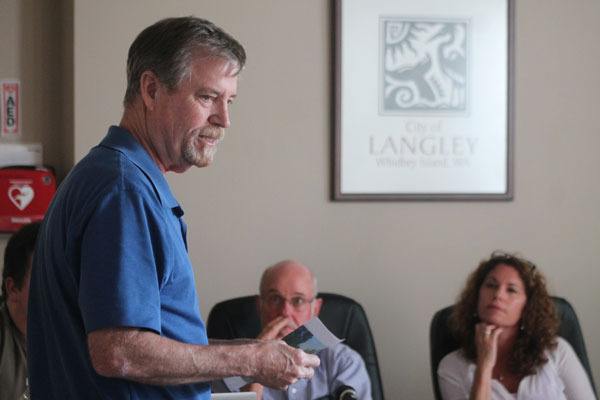The discovery of pollutants in a Langley retention pond have put dredging plans in limbo and left city leaders with more questions than answers over their next step.
The pond, which is located near Suzanne Court, was found to contain trace amounts of barium and diesel fuel in its soil, and the sheer volume of the polluted muck that needs to be removed is too much for Island County to handle. County officials stress the situation does not constitute a health hazard, but they simply lack the facilities to properly process the soupy mess. That’s left Langley with little choice but to scrap its dredging plans, at least for the time being.
“We’ll go to Plan B from there,” according to Stan Berryman, director of Langley Public Works. “The first thing we have to do is dry it out.”
The pond collects storm water runoff and is slowly filling with sediment, and the pollutants are likely from city streets, Berryman said. Dredging would increase its capacity and improve drainage.
According to Joantha Guthrie, Solid Works coordinator for Island County, the department’s refusal to accept the dredged material is a largely a matter of anticipated volume, though the contamination is a complicating factor. The polluted muck dredged from the estimated half-acre pond must be spread out and dried before being transported to a landfill and the county doesn’t have the space required.
“You can’t just send a soupy mess into the waste stream and send it down the road,” Guthrie said.
The contamination levels of the two materials found in test samples were not enough to warrant a more serious response, she said. Materials accepted by the county are ranked as solid waste, dangerous and hazardous, and Langley’s storm water pond soil was determined as solid waste only — the least toxic of the three.
“It’s not considered hazardous waste or dangerous waste,” Guthrie said.
In an emailed response about the frequency of this procedure, state Department of Ecology, Northwest Region, spokesman Larry Altose said local governments “routinely clean accumulated sediments out of retention ponds and catch basins. These facilities trap sediments that typically contain some pollutants that otherwise would have continued to Puget Sound.”
The pond’s soil trapping the contaminants was a sign that it did its duty by keeping it from flowing into Puget Sound, Berryman said.
Andrea Krohn, environmental specialist with Island County Public Health, said as long as it was properly disposed of, the diesel and barium should not worry anyone. Regular sampling of Langley’s water ensures that it is safe to drink, and that testing would catch any unhealthy levels of contaminants. But it still needs to be removed.
“The city should put a plan together in managing the material,” Krohn said.
The issue was brought up at Monday’s city council meeting. Doug Slaten, whose property holds the pond, said the city has not done any maintenance on it for the 10 years he lived there, and in that time he has watched it become “encroached on by invasive, aquatic plants” and stop functioning as well.
“The function of this pond as a detention pond is in a sorry state,” Slaten told the council during public comments.
In an earlier interview with The Record, Berryman said he did not believe the situation was a public health threat, echoing the position of county officials, but he also made it clear he wouldn’t take a dip in the pond himself.
“I wouldn’t want to go swimming in it, there’s too much algae,” he said.
Berryman also noted the county’s refusal was something of a surprise. Langley Public Works had the soil tested early in the spring and received verbal approval that the county would accept the material. A later followup communication revealed that the county had changed its mind.
The second headache Langley faced was no one wanted the job. No bids were submitted to win the work of dredging and hauling the material out of Langley.
Langley’s plan now is to have the pond drained by the company that handles citywide tree pruning. That same company, Berryman said, has cleared out detention ponds for Oak Harbor. Clearing the outfall will help the pond drain. Once dried out, the contracted workers will take out a lot of the vegetation that has grown in the pond, as well as clearing the outfall to help water exit toward Saratoga Passage. The contaminated soil will stay put.
The hope is that by drying out the vegetation, the cost of disposing of it will decrease. Langley was considering using some of its own composting site near its wastewater treatment plant to dry out the dredged mud, if no other alternative could be found.
The most visible channel for the city’s storm water is Brookhaven Creek, which is partly daylighted and partly underground through downtown and meets Puget Sound at Seawall Park.
Berryman said the cost of the project skyrocketed from its initial budget of $40,000.
“To completely get this pond to where it was when it was built will cost at least four or five times that,” he said.



